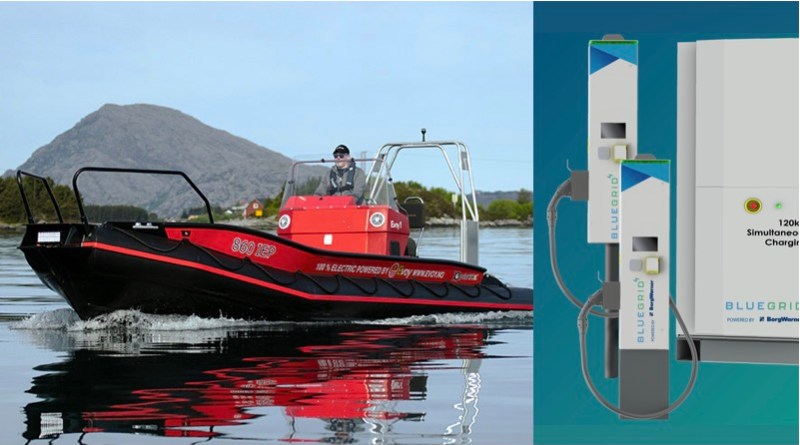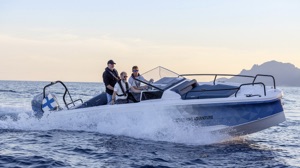Evoy teams up with Canadian company for new Vessel to Grid charging and storage
Norwegian electric boat motor manufacturer Evoy will be partnering on a Vessel to Grid (V2G) electricity charging and storing solution with Canadian firm Rimot.
Rimot has developed their BlueGrid technology as a bi-directional charging system that can turn electric vessels into virtual power plants (VPP) by using the batteries to store electricity that can be fed back into the onshore grid when required. It is the same concept as the electric car Vehicle to Grid systems in London, Tokyo, New York and other cities, but in this case the electric Vehicle is a Vessel.
Rimot predicts that electric vessels will become economical energy storage resources that can support electricity grids at times of greatest demand without negatively impacting vessel operations. For commercial vessels, long term fuel/energy costs are greatly reduced with a switch from fossil fuel to electric propulsion. The V2G system adds another incentive for going electric by providing revenue streams for the vessel owners.
Data management key for Vessel to Grid
The BlueGrid platform is an aggregator that can monitor the batteries of many electric vessels at the same time, creating a combined storage capability that can hold as many kiloWatthours as the batteries connected.
The key to it all is data management. BlueGrid uses the information from the vessels, chargers and the grid to make real time and predictive models of the best times to charge the vessels, leave their storage untouched or feed electricity into the grid.

Another aspect of the data management that is beneficial to electric boat owners is that it can schedule the charging of boat batteries for low-demand periods where grid power is less expensive.
In the broader view of things, V2G (whether vehicle or vessel to grid) is helpful in speeding up the transition to renewable energy sources like solar and wind that do not generate electricity (or money for their operators) when the sun or wind are not cooperating. Utilities are more likely to invest in renewables when they know that a variety of energy storage systems, like electric boat aggregated batteries, are available.
Companies and organizations partnering with Rimot include Nova Scotia Power (electrical utility for the province where Rimot is based), the province’s ministry of Natural Resources and Renewables, Fisheries and Oceans Canada and Dalhousie University, home to the Jeff Dahn Research Group, a world-renowned leader in battery chemistry development.
Evoy leader in electric boats for aquaculture
One of the first projects Rimot was involved in was a study analyzing ways to de-carbonize Nova Scotia’s lobster fishery. This fits in well with Evoy, who have been the leaders in developing electric boats for the aquaculture industry in Norway.
They have also been leaders in helping build the charging infrastructure for that industry. In 2021 they began working with Norwegian power companies SFE and BKK, the Municipality of Kinn and the Port of Florø, where Evoy is located. They have also been working with global marine charging network Aqua superPower.
Evoy, X Shore partner with Aqua superPower
Evoy is already supplying the electric motors – either outboard or inboard – for more than a dozen commercial and recreational boat manufacturers and have adopted the universal electric vehicle Combined Charging System (CCS) used in Aqua’s high speed charging stations. With twin CCS2 connectors and a power of 75kw, a station can simultaneously recharge two electric boats in as little as 20-40 minutes.
“In complementary ways, Rimot and Evoy are each focused on getting more V2G-enabled electric vessels on the water, said Andrew Boswell, Founder & CEO, Rimot. “This partnership is setting a new foundation for both companies to build on our respective expertise and technology to significantly lower emissions for marine transportation and the electric grid.”
Leif A. Stavøstrand, Co-founder & CEO of Evoy, said “As someone who was born in Canada, I am excited about pursuing partnerships and opportunities that will expand Evoy’s impact in North America and farther. Fighting climate change and getting to net zero means that the oceans sector must play a major role in reducing its emissions and having companies like Evoy and Rimot collaborate can only improve results for the planet.”


